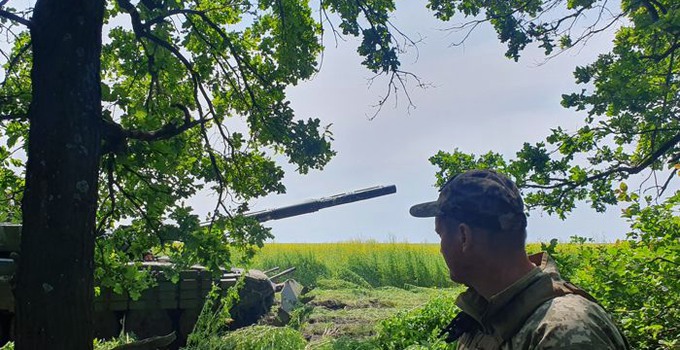
Daniel Smith is interested in understanding how to build cohesion when there is no standing unit that continuously trains together and how to create units and soldiers with a greater chance of surviving war and combat with fewer psychological and physical injuries. Photo: Private
Field studies in Ukraine provide insights about cohesion in military units
Daniel Smith's PhD project focuses on understanding what contributes to cohesion in military units. To explore this, he has conducted interviews with soldiers and officers who have experience from the ongoing war in Ukraine.
Over a total of three months, from May to September, Daniel Smith traveled across Ukraine to interview soldiers and officers who have participated in combat about their experiences. This work is part of his doctoral project in war studies, which revolves around understanding how cohesion is built in military units. Now, he is back to his routine at the Swedish Defence University.
"I want to understand what contributes to cohesion, making a military unit function as a larger entity and not just a collection of different individuals," he says.
The subject is highly relevant in Ukraine, where many civilians with various professional backgrounds are rapidly trained as soldiers and officers to participate in combat. However, it is also relevant in Sweden, where conscription has been reintroduced and expanded in recent years.
"I am interested in how we can improve cohesion when there is no standing unit that continuously trains together and how we can create units and soldiers with a greater chance of surviving war and combat with fewer injuries, both physical and psychological," says Daniel Smith.
Starting point in the war in Ukraine
He had already started his doctoral studies when Russia invaded Ukraine in February 2022, but he quickly realized that Ukraine would be the focal point of his research.
"It became so clear that there was no point in doing anything else. It's not like in Afghanistan or Iraq, where one side had an advantage in education, equipment, intelligence, and especially fire support. In Ukraine, they fight from a disadvantaged position, and it requires something else."
Visited units across the country
Daniel Smith is a captain in the army and has long been interested in how to create well-functioning groups and squads. He believes that his military background was necessary to conduct the interviews onsite in Ukraine. Planning meetings in Ukraine is challenging, and much can change with short notice when the country is at war.
"Being able to be onsite has been key in this work, and I could not have conducted these interviews in any other way," he says.
He completed the entire journey on a motorcycle, which turned out to be a significant icebreaker, leading to new contacts and tips along the way.
"Many people approached and started talking when they saw the motorcycle. It somehow signals that it's not an official visit and arouses curiosity."

Daniel Smith is a captain in the army and argues that his military background has been necessary to conduct interviews onsite in Ukraine. Photo: Private
Everyday life in the western parts of Ukraine
Travelling in Ukraine worked surprisingly well. In many parts of the country, daily life goes on more or less as usual, even though the war makes itself known through curfews, patriotic posters, and a military presence on the streets.
"There are also many people in the western parts of the country because many have moved from the front in the east. You also see many who have been injured in the war."
In the eastern parts closer to the front, the war is more tangible. Public services become scarcer, you need to pass several lines of checkpoints and roadblocks along the roads, and the right documents and permits are required to move around.
"There are civilians who chose to stay within the militarized zone, and it's challenging to accidentally end up in a place where there are ongoing clashes. But you need to plan for the unexpected. For example, I brought a sleeping bag and equipment to stay outdoors if needed," says Daniel Smith.
The human aspect of combat
Now that he is back home, processing and analyzing the collected material remain, leading to a completed dissertation in a few years.
"In addition to contributing to the field of research, I hope that my research can remind people of the human aspect of combat and warfare. It's easy to see war as something purely instrumental. We talk about defeating the enemy, but we are dealing with individuals. It's not a clinical process but something entirely different."
He argues that if we become better at preparing soldiers and officers for what actually happens in war, they will have better conditions to perform their tasks and less risk of subsequent trauma.
"In Ukraine, it is clear that many carry difficult experiences, and the war hangs like a veil over the everyday lives of many."
How has the time in Ukraine affected you in your role as an officer?
"I am even less eager to fight, but at the same time, even more convinced of the importance of going into battle if war were to come. If someone invades our country, there is no other answer than to do what is necessary to defend ourselves, which strengthens my conviction about the need for good training and military capability."
Read more about Daniel Smith's PhD project.
More about
Page information
- Published:
- 2023-12-15
- Last updated:
- 2024-12-04
